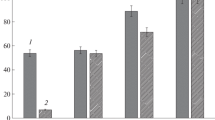Abstract.
Thirteen clinical isolates of Pasteurella multocida from a variety of different animals and humans were examined for their ability to produce lipase. Lipase substrates used included Tween 20, Tween 40, Tween 80, and Tween 85. Lipase activity was detected in the filtrates of organisms grown to the exponential phase in Roswell Park Memorial Institute-1640 defined media (RPMI-1640), but activity increased in the filtrates when the cultures were allowed to proceed to the stationary phase. All strains examined (except for serotype 2) showed lipase activity against at least one of the Tweens. Tween 40 was the best substrate to demonstrate lipase activity. Pasteurella multocida serotype 8 produced the most active lipase against Tween 40 (3,561.7 units of activity/μg of protein). This activity continued to increase after P. multocida entered a stationary growth phase. P. multocida lipase activity was optimal at pH 8.0. Lipase activity of P. multocida serotype 8 was eluted from a Sepharose 2B column at several points, indicating that several lipases may be produced in vitro by this organism. These data demonstrate that clinical isolates of P. multocida produce lipase; therefore, this enzyme should be considered a potential virulence factors for this organism.
Similar content being viewed by others
Author information
Authors and Affiliations
Additional information
Received: 16 September 1999 / Accepted: 22 November 1999
Rights and permissions
About this article
Cite this article
Pratt, J., Cooley, J., Purdy, C. et al. Lipase Activity from Strains of Pasteurella multocida . Curr Microbiol 40, 306–309 (2000). https://doi.org/10.1007/s002849910061
Issue Date:
DOI: https://doi.org/10.1007/s002849910061



